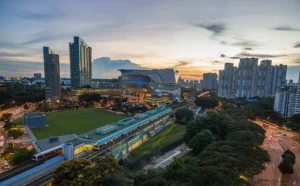Property taxes play a pivotal role in sustaining the infrastructure and amenities that enhance the livability of our cities. The Municipal Corporation of Gurugram (MCG) levies property taxes, which serve as a vital source of revenue for the city’s development and community welfare initiatives.
Table of Contents
MCG Gurgaon Property Tax applies to all properties within the Municipal Corporation’s jurisdiction. The tax assessment is determined by considering factors such as the property’s size, location, type and declared value per the government’s assessment process.
This comprehensive guide provides a clear and concise overview of MCG property tax in Gurgaon, covering its payment methods, benefits, and the factors influencing it. So, let’s begin!
MCG Property Tax on Residential Property (House)
| Area | Property Tax |
| 300 sq, yards | Rs 1 per sq yard |
| 301-500 sq, yards | Rs 4 per sq yard |
| 501-1000 sq, yards | Rs 6 per sq yard |
| 1001 sq. yards to 2 acres | Rs 7 per sq yard |
| Above 2 acres | Rs 10 per sq yard |
MCG Property Tax on Vacant Plots (Residential & Commercial Space)
| Area | Property Tax (Residential) | Property Tax (Commercial) |
| 100 sq. yards | Exempted | Exempted |
| 101-500 sq. yards | Rs 0.5 per sq. yard | Rs.0.5 per sq. yard |
| Above 501 sq. yards | Rs 1 sq. yard | Rs 1 per sq. yard |
MCG Property Tax on Commercial Property
| Area | Rate Per Sq. Foot |
| 1000 square feet | Rs 12 |
| Above 1000 square feet | Rs 15 |
MCG Property Tax for Industrial space
| Area | Rate Per Sq. Yard |
| 2500 sq, yards | Rs 5 |
| 2501 sq, yards to 2 acres | Rs 6 |
| 2 to 50 acres | Rs 8 |
| Above 50 acres | Rs 9 |
Step-by-Step Guide for Online Payment
Here’s a detailed step-by-step guide on how to pay property tax through the Official MCG (Municipal Corporation of Gurugram) Website:
Access the Official MCG Website: Go to https://www.mcg.gov.in/ to reach the Municipal Corporation of Gurugram’s official website.
Navigate to the “Property Tax” Tab: Look for the “Property Tax” section on the website’s main menu or sidebar. Click on this tab to proceed with the property tax payment process.
Select “Property Tax Bill”: Within the “Property Tax” section, locate and choose the option labelled “Property Tax Bill.” This initiates the process of paying your property tax online.
Enter Property Details: You will be prompted to provide specific details related to your property. Fill in the necessary information such as Property ID, Owner Name, contact details, Zone, Locality, Ward, and Address. Ensure the accuracy of the details entered.
Verify Entered Details: Review all the information you’ve provided to ensure it’s accurate and matches the property records. Once verified, click on the “Search” button to proceed.
Check Property Tax Amount: The system will display the property tax amount based on the entered details. Verify that the displayed amount aligns with your property tax liability.
Choose Payment Method: If the displayed property tax amount is correct, proceed to make the payment. The website typically offers various payment options like debit/credit cards, net banking, or UPI wallets. Select your preferred payment method.
Complete Payment: Follow the prompts to enter the necessary payment details and complete the transaction securely. Ensure you follow the payment gateway’s instructions and provide accurate information for a successful payment.
Receipt Generation: Upon successful payment of MCG Gurgaon Property Tax, the system will generate a payment receipt. Make sure to print or download this receipt for future reference. It serves as proof of your property tax payment.
While following these steps, it’s crucial to double-check the accuracy of the information entered to avoid any errors in the payment process. Additionally, keep the generated receipt safe for record-keeping and any future queries related to your property tax payment.
Offline Payment Method
Property owners who prefer traditional offline payment methods can conveniently pay their property taxes at designated Property Tax Collection Centers across Gurgaon or at any Oriental Bank of Commerce branch situated within the city.
How can Ganga Realty Help in Paying Property Tax?
Paying property tax might seem like a mundane responsibility for homeowners, but when you choose Ganga Realty as your real estate partner, the significance transcends mere compliance. Here’s why paying property tax with Ganga Realty is a decision that aligns with your aspirations for a better, sustainable future:
Commitment to Sustainability: Property tax revenue funds the development and implementation of environmentally conscious practices, such as energy-efficient buildings, waste management systems, and green spaces. These initiatives contribute to a healthier environment and a more sustainable future.
Community Development: Property taxes are essential for the upkeep and development of local communities. They fund essential services like road maintenance, sanitation, and security, ensuring residents’ and businesses’ safe and thriving environment.
Investment in Quality Living: By paying property tax, you actively invest in maintaining living standards in your residential or commercial spaces. These taxes go towards essential services like road maintenance, sanitation, and security, ensuring a high-quality living environment for residents and businesses.
Support for Innovation: Property tax payments foster innovative solutions for better waste management, energy efficiency, and infrastructure upgrades, creating a more efficient and modern living and working environment.
Compliance and Legal Assurance: When you pay property tax through Ganga Realty, you benefit from their expertise in regulatory compliance. They ensure that your tax payments adhere to all legal requirements, saving you from potential hassles or penalties associated with non-compliance.
Transparent and Trustworthy Process: Ganga Realty ensures a transparent process for property tax payments. Their streamlined systems and ethical practices provide homeowners with peace of mind, knowing that their contributions are directed towards the intended developmental purposes.
Penalty for Late Payment
Ensuring prompt property tax payments is crucial to avoid incurring penalties. In cases of delayed payments, a monthly interest of 1.5% is levied on the outstanding tax amount. Moreover, deliberate under-reporting of property details results in fines equivalent to the amount of tax evasion capped at the initial tax liability.
Property Tax Rebates in Gurgaon
The Municipal Corporation of Gurgaon (MCG) offers significant exemptions on property tax for specific categories of property owners. These exemptions are extended to owners of small flats within housing societies, certain individuals with self-occupied properties, and properties falling under the Lal Dora category. Availing these exemptions can lead to substantial savings for eligible property owners in Gurgaon.
Final Thoughts
Paying MCG Gurgaon Property Tax holds immense significance in sustaining the city’s development and ensuring the provision of essential civic amenities. The online payment process, facilitated by the MCG’s official website, offers convenience and efficiency for property owners, emphasising the importance of accuracy in detail to avoid complications.
Moreover, the strategic choice of Ganga Realty as a partner for property tax payments transcends conventional compliance. It aligns with a commitment to sustainability, community development, and innovation. By opting for Ganga Realty, homeowners contribute directly to eco-friendly initiatives, local community enhancement, and improving living standards.
Ganga Realty ensures legal compliance and guarantees transparency and trustworthiness in the tax payment process, assuring homeowners that their contributions are ethically directed towards fostering a better, more sustainable future.








